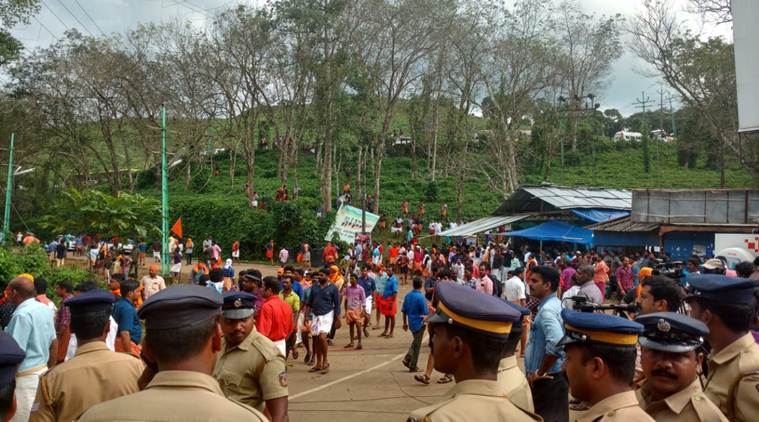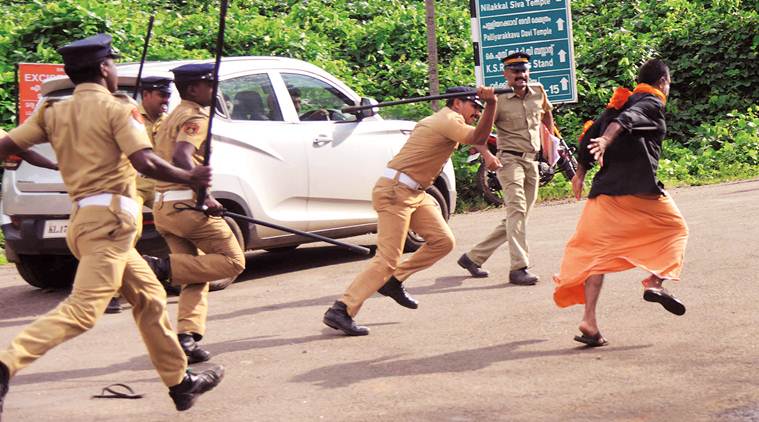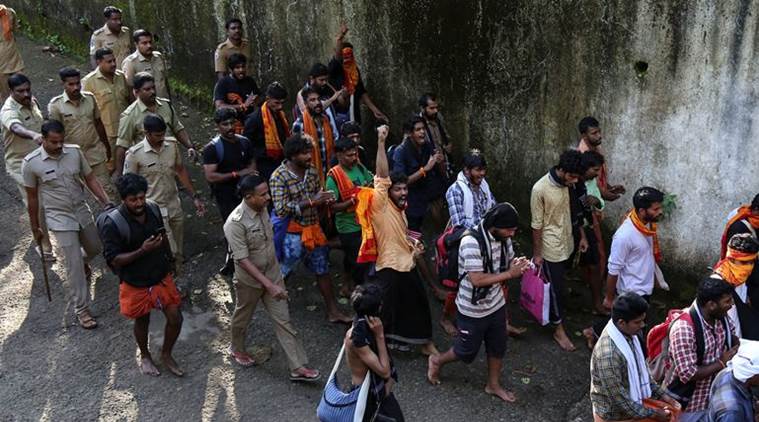 Thursday was the first day of the month of ‘Thulam’, when the temple opened for monthly rituals. (Source: Vishnu Varma)
Thursday was the first day of the month of ‘Thulam’, when the temple opened for monthly rituals. (Source: Vishnu Varma)
“Are all Supreme Court verdicts being followed? What about underpaid nurses in Kerala? Despite SC orders, why are their wages not hiked? What about the Jacobite Church row?” 43-year-old Jayarajan from Perinthalmanna in north Kerala had a flurry of questions about the implementation of the top court’s order lifting age restrictions on the entry of women at the Sabarimala temple.
“I don’t understand why all the energy is focused on Sabarimala,” Jayarajan said. He is among those who do not want women of menstruating age to enter the hill shrine. “Vishwasam aanu, athine thagarkkaruth (It’s a belief, don’t break it),” he said.
Thursday was the first day of the month of ‘Thulam’, when the temple opened for monthly rituals.
Pamba, the base camp of the temple, which had seen protests and detention of members of the priest family and the Pandalam royal family on Wednesday, presented a very different picture on Thursday. There were no protests. With Section 144 in place, there were no major disturbances. A few members of the Yuva Morcha who had come prepared to violate Section 144 were detained and whisked away at Nilakkal.
Scores of pilgrims, ferried in state transport buses from Nilakkal, arrived in Pamba and proceeded to walk a few hundred metres to take a dip in the Pamba river. After the dip, the pilgrims trekked in small groups for 5 km to the main shrine of Ayyappa.
 During a clash between protesters and police at Nilakkal base camp. (Photo: Vignesh Krishnamoorthy)
During a clash between protesters and police at Nilakkal base camp. (Photo: Vignesh Krishnamoorthy)
The protests and violence of Wednesday may have died down, but the sentiments were still palpable on Thursday. Along the route, groups of young men were following the news on their cell phones. Referring to the woman journalist from New York Times who was blocked by protesters on the way to the shrine, one of the men said, “Ha, she couldn’t go to the top. Good for her. As long as we are there, we will not allow any young woman.”
Some activists of Hindu Aikya Vedi expressed their displeasure with the media. One of them said, “Why is the media calling us Hindu terrorists? Are we terrorists? Why is the media hell bent on allowing young women into Sabarimala?”
Similar sentiments were voiced by women devotees as well. Amudha Bhaskar, 63, from Bengaluru was trekking to Sabarimala for the fourth time. “The core of worship at Sabarimala is the 41-day vow. Can young women take the vow with all seriousness? Won’t their menstrual cycle affect the vow of abstinence? I am not in favour of their entry,” she said.
 Policemen escort members of the Hindu groups to Pampa base camp, to prevent them from clashing with women of menstrual age entering Sabarimala temple for the first time in centuries, in Pathanamthitta district. (PTI photo)
Policemen escort members of the Hindu groups to Pampa base camp, to prevent them from clashing with women of menstrual age entering Sabarimala temple for the first time in centuries, in Pathanamthitta district. (PTI photo)
Thavan, a woman in her 60s from Krishnagiri district in Tamil Nadu, said, “If women between the ages of 10-50 enter the temple, they will not be blessed by God. Whatever the SC says, men will be men and women will be women.”
Meanwhile, at the hill-top, pilgrims waited patiently in short queues in front of the sacred 18 steps (pathinettu padi). For the second day, no woman between the ages of 10-50 climbed the hill.